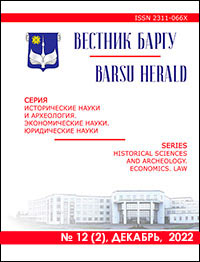MAIN THEORETICAL PROVISIONSOF THE HISTORIOSOPHICAL CONCEPT OF F. KONECHNY
Keywords:
F. Konechny; historiosophy; historiography; concept; civilization; Latin civilization; Turanian civilization; place and role; historical patternAbstract
The problem of comparing the historical path of Western Europe and the rest of mankind as a whole, and Poland and Russia, in
particular, as part of the Western world, or as part of an independent, one-of-a-kind phenomenon, or a peculiar combination of these two principles (as the supporters of the theory of Eurasianism tried to explain in relation to Russia, and in Poland — supporters of the theory of
Sarmatism), was one of the most important in Polish and Russian historiosophical thought of the 18th — early 20th centuries.
Modern civilizational discourse makes relevant the historiosophical theory of the Polish historian and philosopher F. Konechny. Civilization, interpreted by F. Konechny as the main subject of history, is the basis of his search for the laws of the historical process. He was interested in regularities of the most general order, such that take place at the level of the most highly organized social structures and are obligatory without exception. Based on this attitude, the scientist determined the role and place in the world historical process of both Western European civilization in general and Poland and Russia in particular. In this article, the authors consider the undeservedly forgotten historiosophical concept of F. Konechny, which, for political reasons, did not receive the same fame as the works of O. Spengler,
N. Ya. Danilevsky and A. Toyinby, however, should be considered as a phenomenon of the same order.
Ref.: 18 titles.
Downloads
Published
Issue
Section
License
Copyright (c) 2023 Вестник БарГУ Серия "Исторические науки и археология. Экономические науки. Юридические науки"
Это произведение доступно по лицензии Creative Commons «Attribution-NonCommercial» («Атрибуция — Некоммерческое использование») 4.0 Всемирная.
Авторы сохраняют за собой право заключать определенные договорные соглашения, касающиеся неисключительного распространения опубликованной версии работы (например, размещать ее в институциональном репозитории, публикация в книге) со ссылкой на ее первоначальную публикацию в этом журнале.





